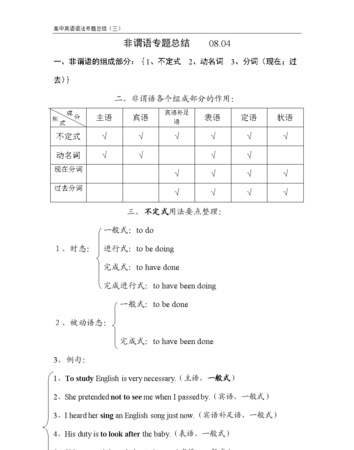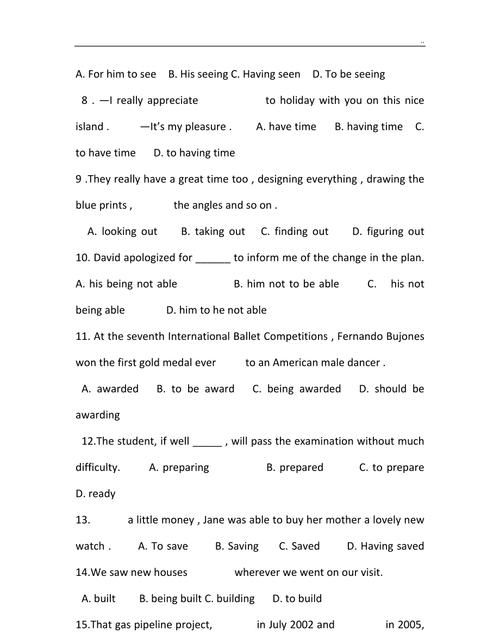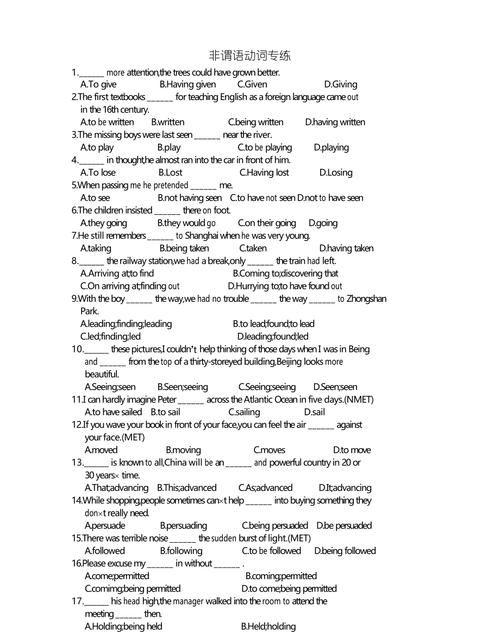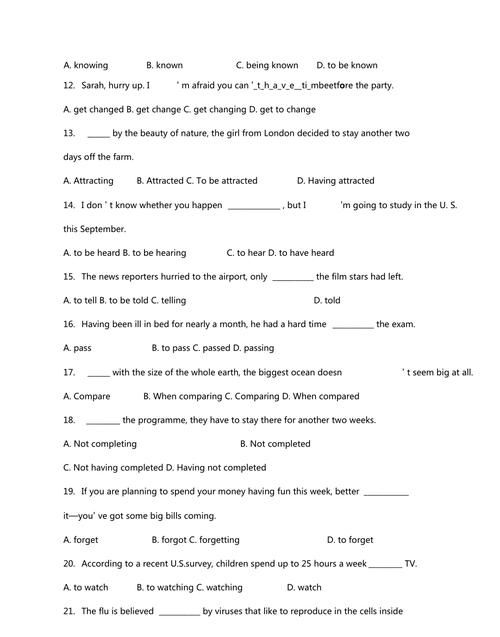本文目录
初中英语非谓语动词专项训练及答案
1.(2010·潍坊中考)At least 300 million people are using QQ_______ by Ma Huateng to chat on line.
A. create B. creates C. creating D. created
【解析】选D
2.(2010·成都中考)—Where’s your brother now, Bob?
--I saw him _______in the street a moment ago and I told him_________.
A. playing ; don’t do so B. playing; not to so C. play; to do so
【解析】选B
3.(2010·通化中考)The woman made his son_____ finally after she told him some jokes.
A. laughed B. to laugh C. laugh D. laughing
【解析】选C
4.(2010·河南中考)Father often tells me too much time on computer games.
A. don’t spend B. not spend C. not to spend D. not spending
【解析】选C
5.(2010·黄冈中考)—How would your family like to travel?
--It’s a problem in my family. Mother prefers to take a bus to travel, while father always sticks ______to travel.
A. to drive B. to driving C. driving D. drive
【解析】选B
6.(2010·聊城中考)The teachers often tell their pubils ________ across the road when the traffic light is red.
A. not go B. not to go C. don’t go D. didn’t go
【解析】选B
7.(2010·陕西中考)Don’t forget _________an umbrella _______you.It’s going to rain.
A. to take; to B.taking;to C.to take;with D.taking;with
【解析】选C
8.(2010·梧州中考)English is very important,so I practice________it very hard.
A.speaks B.to speak C.speaking D.speak
【解析】选C
9.(2010·莱芜中考)Most of the young people enjoy ______ Jay Chou's songs.
A.sing B.sang C.singing D.to sing
【解析】选C
10.(2010·哈尔滨中考)As teenagers, we’re old enough ________ with housework. We can help
set the table, wash the dishes and clean our own rooms.
A. to help B. helping C. helped
【解析】选A
11. (2009·德州中考) When he arrived at the office, he found all the workers ________.
A. working B. work C. to work D. worked
【解析】选A。find sb. doing sth.表示“发现某人正在做某事”。
12. (2009·宁夏中考) She won’t let her daughter _________ by the river.
A. play B. plays C. to play D. playing
【解析】选A
13. (2009·齐齐哈尔中考) -Would you mind my _________ here?
-Sorry, you’d better not.
A. smoke B. to smoke C. smoking
【解析】选C。三个选项是动词smoke的三种形式,结合问句中的“Would you mind”可排除A、B二项。“Would you mind me/my doing...?”句型,表示“我做……你介意吗?”。
14. (2009·潍坊中考) –Would you like to go fishing with me?
-I don’t feel like it. I would rather _________ at home and have a sleep.
A. stay B. to stay C. staying D. stayed
【解析】选A
15. (2009·锦州中考) When we practice speaking English, we often end up _________ in Chinese.
A. to speak B. speaking C. spoken D. speak
【解析】选B。end up doing sth.表示“结束做某事”,故正确答案为B。
16. (2009·绍兴中考) –Is Jack in the library?
-Maybe. I saw him _________ out with some books just now.
A. going B. go C. to go D. went
【解析】选B。由关键词saw him可知联想到see sb. do sth.和see sb. doing sth.两个句式。结合提中所给信息just now可知题意为“我刚才看见他带着一些书出去了”,表示“看见某人做过某事”要用see sb. do sth.,do为省略to的动词不定式,故选B。
17. (2009·雅安中考) Sam likes cars. He enjoys _________ all kinds of model cars.
A. collects B. collecting C. to collect D. collected
【解析】选B
18. (2009·广东中考) The old man is ill and he doesn’t feel like _________.
A. to eat something B. to eat anything
C. eating something D. eating anything
【解析】选D。feel like后面接动词时要用动词-ing形式,先排除A、B二项;另在否定句中要用anything,故舍C选D。
19. (2009·兰州中考) Why not _________ your teacher for help when you can’t finish ________ it by yourself?
A. ask; write B. to ask; writing C. ask; writing D. asking; write
【解析】选C。why not后面接省略to的动词不定式,即动词原形,先排除B、D二项;另finish后面接动词时要接动词-ing形式,故舍A选C。
20. (2009·深圳中考) -How about _________ in the river with us? -Sorry I can’t. My parents often tell me _________ that. A. swim, don’t do B. swim, to do C. swimming, not do D. swimming, not to do 【解析】选D。介词about后面接动词时用动名词形式,先排除A、B二项;另tell sb. not to do sth.表示“告诉某人不要做某事”,故舍C选D。
21. (2009·宿迁中考) The young man used to ________ to work, but he is used to ________ to work now.
A. drive; walking B. drove; walked C. drive; walks D. driving; walk
【解析】选A。used to意为“过去常常……”,后面接动词原形,先排除B、D二项;另be used to意为“习惯……”,其中to是介词,后面接动名词,故舍C选A。
22. (2008·乌兰察布中考) –Where’s Mr. Yu, do you know?
-Well, it’s hard to say. But I heard him _________ loudly here just now.
A. was reading B. reading C. had read D. to read
【解析】选B。hear sb. doing sth.表示“听见某人正在做某事”,而hear sb. do sth.表示“听见某人做过或经常做某事”。结合题意可选B。
23. (2008·黄石中考) –Why are you so worried?
-I had my MP4 ________ yesterday.
A. steal B. stole C. stealing D. stolen
【解析】选D。“have+宾语+过去分词”结构中的宾语与其后的过去分词为被动关系,表示“请/让别人做某事 (自己不参与) ”,分析题意可选出正确答案为D。
24. (2008·自贡中考) -What about hiking this Sunday?
-Great. I’d like with you.
A. to go, going B. going, going C. going, to go
【解析】选C。what about后面接动词时要用动词-ing形式,I’d like to do sth.表示“我想要做某事”。故正确答案为C。
25. (2008·黄冈中考) –How do you feel when watching the national flag going up?
-It makes me ________ very proud.
A. felt B. to feel C. feeling D. feel
【解析】选D。本题考查省略to的动词不定式。make sb. do sth.表示“使得某人做某事”,do为省略to的动词不定式。
26. (2008·重庆中考)During the Spring Festival, the heavy snow stopped many people from _________ back home.
A. go B. goes C. went D. going
【解析】选D。本题考查动名词的用法。stop sb. from doing sth.表示“阻止某人做某事”。
27. (2008·黄石中考) –Why are you so worried?
-I had my MP4 ________ yesterday.
A. steal B. stole C. stealing D. stolen
【解析】选D
28. (2008·山西中考) -_________ you _________ take a bus to school?
-Yes.But now I usually go to school on foot.
A. Did; use to B. Were; used to C. Do; use to
【解析】选A。结合关键信息“Yes”和“But now I usually go to school on foot.”可推断出上句题意为“你过去常常乘公共汽车上学吗?”,故要用used to的一般疑问句,排除B、C二项,选A。
29. (2008·乌兰察布中考) –Where’s Mr. Yu, do you know?
-Well, it’s hard to say. But I heard him _________ loudly here just now.
A. was reading B. reading C. had read D. to read
【解析】选B
30. (2008·莆田中考) If you feel tired, you may stop ________.
A. have a rest B. to have a rest C. having a rest
【解析】选B。stop doing sth.表示“停止做正在做的事情”,而stop to do sth.表示“停止做正在做的事情开始做另外一件事”。
31. (2008·咸宁中考) -_________ did you tell him about the news?
-By ________ an e-mail.
A. How; sending B. How; send C. How; sent D. What; sending
【解析】选A
32. (2008·莱芜中考) -You aren’t a stranger, are you?
-_________, don’t you remember _________ me at the school gate ten minutes ago?
A. Yes; to see B. No; seeing C. No; saw D. Yes; seeing
【解析】选B。remember doing sth.表示“记得做过某事”,remember to do sth.表示“记得将要做某事”,结合关键信息don’t you remember和ten minutes ago可确定答案为B。
33. (2008·漳州中考) –In the movie Love Me Once More, Mom is moving.
-Yes. Every time I see it, I can’t help _________.
A. cry B. crying C. to cry D. cried
【解析】选B。can’t help doing sth.表示“忍不住做某事”。
34. (2008·宿迁中考) The words that we should pay attention to ________ on the blackboard.
A. being written B. are written C. is writing D. writing
【解析】选D。pay attention to后面接动词要用动词-ing形式。
35. (2008·泰州中考) She used to _________ with her parents, but now she is used to ________ with her classmates at school.
A. live; living B. live; live C. living; living D. living; live
【解析】选A
36. (2008·北京中考)-Linda, when shall we take a walk?
-After I finish ________ the dishes.
A. wash B. washed C. to wash D. washing
【解析】选D。finish后面接动词时要用动词-ing形式。
二、填空题
1. (2009·常州中考) I’m looking forward to (居住) in the new flat.
【答案】填living
2. (2009·泰安中考) Listening to music is a way of (放松) yourself.
【答案】填relaxing
3. (2009·广元中考) –I don’t know what to do when I grow up.
-How about ________ (工作) as a reporter for our newspaper?【答案】填working
4. (2009·东营中考) Chinese parents are strict with their children and usually stop them from _______ (逗留) out too late with friends.
【答案】填staying
5. (2009·济宁中考) We have collected lots of waste paper and bottles for ________ (回收) since last year.
【答案】填recycling
6. (2008·黄冈中考) David is very clever. He spent only ten minutes ________ (算出) out the difficult maths problem.
【答案】填working
7. (2008·河北中考) We practised _______ (唱) English songs for one and a half hours today.
【答案】填singing
8. (2008·徐州中考) Jim has lived in Australia for two years. He is used to ________ (驾驶)on the left.
【答案】填driving
9. (2009·恩施中考) It’s hard to give up ________ (smoke), but you have to.
【答案】填smoking
10. (2009·宿迁中考) He likes English. He spends lots of time ________ (read) it every day.
【答案】填reading
11. (2009·兰州中考) He kept on ________ (talk) until the class was over.
【答案】填talking
12. (2009·孝感中考) Would you mind ________(close)the window? It’s raining outside.
【答案】填closing
13. (2008·无锡中考) Playing computer games is delightful, but ________ (spend) too much time on it may do harm.
【答案】填spending
14. (2008·无锡中考) The first step towards ________ (protect) the environment is to try to throw away less rubbish.
【答案】填protecting
15. (2008·泰州中考) -What about ________ (have) a bird’s eye view of Shanghai?
-Great! I can’t wait to.
【答案】填having
16. (2008·镇江中考) Jim was good at ________ (draw) pictures when he was a little child.
【答案】填drawing
17. (2008·襄樊中考) She enjoyed ________ (play) the piano when she was very young.
【答案】填playing
18. (2008·乌兰察布中考) The students were busy ________ (do) the homework.
【答案】填doing
19. (2008·烟台中考) P________ future can be difficult. You never know what will happen in twenty years.
【答案】填Predicting
20. (2008·扬州中考) All the students know ________ (hand) in homework on time is necessary.
【答案】填handing
不知道符合你要求吗?合适的话,请及时采纳

英语非谓语动词的题怎么做
Linda worked for the Minnesota Manufacturing and Mining Company,____ as 3M.
解析:凡是非谓语动词都需要在句子中找出它的逻辑主语,此题中的逻辑主语是 Linda,这是其一;其二,不同的非谓语动词表示不同的时间概念,现在分词的一般形式(A、B)表示在句子谓语动词行为发生是通常存在的行为,或者与谓语动词相继发生的行为,现在分词的进行形式(C)表示与其同时发生的行为,不定式(D)表示在谓语动词行为以后发生的行为。
那么下列选项的意思就分别是:
A knowing:Linda 是 knowing 的执行者,即 “Linda 本人知道”,显然与题目的意思是相悖;
B known:Linda 是 known 的行为对象,即“Linda 总别人被知道”;
C being knowning: Linda 是 being known 的行为对象,即 “Linda 正被知道”
D to be known:Linda 是 to be known 的行为对象,即 “Linda 将被别人知道”
另外 (be) known as 意思是“以...知名; 被认为是; 被称为”。
本句非谓语动词的意思显然是琳达作为 3M 而被人所知,正确答案非 B known 莫属。

非谓语选择题带解析
1be lost to 是固定用法 ,迷失在…
2 之所以你会觉得此处应该是主动,而不是被动,是因为汉语与英语在这种情况下的用法是不一样,汉语惯用主动,英语多用被动,举例:
他很兴奋/放松/困惑。He is excited/relaxed/confused.
he was lost to
英语词汇和汉语一样,在经过长时间使用后,词性会发生变化,以上三例也可以是形容词。
所以我觉得解析中说被动有点牵强,流于表面意思,lost已经从lose的过去分词派生为形容词,意思:迷失的,不知所措的.比作为动词时更为贴切。
觉得有道理就采纳?

两道非谓语选择题.解释
1.Do you consider it any good ______again?
A to try B.try C.trying. D for you to try
2.Do you think it any good ___with him again?
据说选to talk.
第一题 选C。 D为什么不可以
请问 这两句不都是it 作形式宾语吗?不是I consider/ think it is good to....... 这样吗?
请帮忙加以区分谢谢!
答:这个问题问得好!
第一题选C
译:你认为再试有用处吗?
析:本题考查形式宾语和真正宾语。源于形式主语it和真正主语it
我们知道,不定式和动名词都可以作主语。如用形式主语it,真正的主语多为不定式:
句型1:it is +adj. + to do sth. 如:it is important to do sth.
句型2:it is +n. +to do sth. 如:it is good manners to do sth.
只有下面这种情况下才用动名词作真正的主语:
It is no good/ no use doing sth.
可能因为成语:it is no good crying over the spilt milk. 之故。
所以第一题源于:Do you consider that it is any good trying again?
-->Do you consider it any good trying again?
“consider 后面只能跟 动名词作宾语 所以其他选项错”,这样的回答是有问题的。这里的真正宾语用动名词,不是因为consider是一个只能跟动名词作宾语(不能跟不定式作宾语)的单宾动词。 consider doing sth. 中的consider作“考虑”解释。当consider 作“认为”解释时,是复宾动词,后跟形容词、名词作宾语补足语。
如:We consider him (to be/as) honest (/an honest man) 我们认为他是一个诚实的人。
没有规定其宾语一定要用动名词,根据需要,可以是名词,可以是不定式,也可以是动名词。
这里真宾用动名词是因为句型:it is no good doing sth. 如将any good 改成necessary,则应用不定式作真宾。
请看网上的例句:
We consider it necessary to protect animals.
Before entering this site, we consider it necessary to briefly introduce you to our website.
I consider it necessary to brush three times a day.
第二题中的think与consider可以互换,都是“认为”,都是跟复合宾语,宾补都是any good,由
I think (that) it is no good doing sth. 变化而来。所以你的那个据说的答案“to talk”并不符合考试英语,也不符合语言习惯。因为有It is no good/ no use criying over spilt milk. 这个widespread的谚语。
关于第二题的答案,我认为是在多人改编题目的过程中走样了的结果。
可能原题句是:
Do you think it good ___with him again?
A to talk B talking C to talking D having talked
答案是A 没错,因为这里的good是形容词,it is good to do sth. 与it is no good doing sth.不是一个句型,good的词性也不一样,后者中的good 是名词,与do good to sb. / do sb. good中的good词性相同,是抽象不可数名词,意为“好处”,可以被限定词no, any修饰。
有人将这一题根据“语感”,在good前加了一个any, 从而改变了句型。但答案没有改。
附:从一道高考题看 consider 的用法
动词consider既可作“考虑”讲, 又可作“看作”讲, 二者有什么区别呢? 让我们走近consider, 看看它有哪些用法吧。
93 NMET试题中的一道单项选择题是:
Charles Babbage is generally considered ______ the first computer.
A. to invent
B. inventing
C. to have invented
D. having invented
此题考查的就是consider的用法。让我们对consider的用法作一归纳, 然后, 再做答案。
一、consider意为“考虑, 细想”时, 其后可跟:
1. 名词或代词:
We must consider the matter from different standpoints.
我们应当从各个角度来考虑一下这件事。
We must consider it very carefully. 我们应仔细地考虑它。
2. 从句:
We must consider what's to be done. 我们必须考虑该怎么办。
He considered how he should answer. 他考虑应当怎样回答。
3. “疑问词+不定式”:
Have you considered how to get there? 你是否考虑过如何到那里?
We have to consider what material to use first. 我们先得考虑用什么材料。
注意: consider作“考虑”解时, 不能直接接不定式。
4. 动名词:
He considered going to see them in person. 他考虑亲自去看望他们。
He is considering changing his job. 他在考虑调换一下工作。
5. 介词over或单独用:
He said they had considered over it. 他说他们已经考虑过了。
Let me consider. 让我考虑一下。
二、consider意为“认为, 以为, 把……看作”, 其后可跟:
1. 从句:
We consider that a friend in need is a friend indeed.
我们认为患难之友才是真正的朋友。
2. 名词的复合结构(即名词作宾语补足语):
We consider Beijing the heart of our country.
我们认为北京是我国的心脏。
3. 带形容词的复合结构:
They considered me too young to do the work.
他们认为我太年轻, 干不了这项工作。
4. 带不定式的复合结构:
We consider only such methods to be correct.
我们认为只有这样的方法才是正确的。
注意: 不定式后主要是be, 间或为其它动词(多为完成式)。
We all considered him to have stolen Tom's wallet.
我们都以为是他偷了汤姆的钱包。
5. 带介词短语的复合结构:
We always consider these people as our true comrades.
我们一向认为这些人是我们真正的同志。
They always consider themselves in the right. 他们总认为自己对。
6. 带“it形式宾语+形容词+真正宾语(动词不定式、从句等)”:
We consider it our duty to help her. 我们认为帮助她是我们的职责。
I consider it a great pleasure that I can work with you.
我觉得能和你在一起工作是极大的快乐。
注意: consider作“认为”解时, 一般不接动名词。
综上所述, 我们可以看出前文所提的93年的那道高考题考查的是consider作“认为”解时的用法, 题干是被动式, 改为主动式为:
We generally consider Charles Babbage ______ the first computer. 不难看出, 这一句子的基本结构为: 主语+谓语+复合宾语(名词+动词不定式), 答案应选动词不定式。因“发明”这一动作已经发生, 故应选to have invented, 即C。
练习: I. 选择填空。
1. They have been considering ______ the problem.
a. to work out
b. work out
c. working out
d. worked out
2. I consider Tom ______ the finest basketball player today.
a. to be
b. being
c. was
d. be
3. I don't know ______ .
a. whether they will consider visiting the Summer Palace
b. whether will they consider to visit the Summer Palace
c. whether they will consider to visit the Summer Palace
d. whether they will consider visit the Summer Palace
4. Our monitor ______ to be an honest man.
a. considers
b. is considering
c. was considered
d. has considered
II. 根据第一句完成第二句, 每空填一词, 使句意不变。
1. He was considering repairing the watch.
He was considering ______ ______ ______ the watch.
2. We consider Lu Xun one of the greatest writers in China.
Lu Xun ______ ______ one of the greatest writers in China.
3. We considered that it was necessary to do so.
We considered ______ ______ to do so.
4. I consider the report to be wrong.
I consider the report ______ .
Key: I. 1. c 2. a 3. a 4. c
II. 1. how to repair 2. is considered 3. it necessary 4. wrong

以上就是关于非谓语题目带答案解析,初中英语非谓语动词专项训练及答案的全部内容,以及非谓语题目带答案解析 的相关内容,希望能够帮到您。
